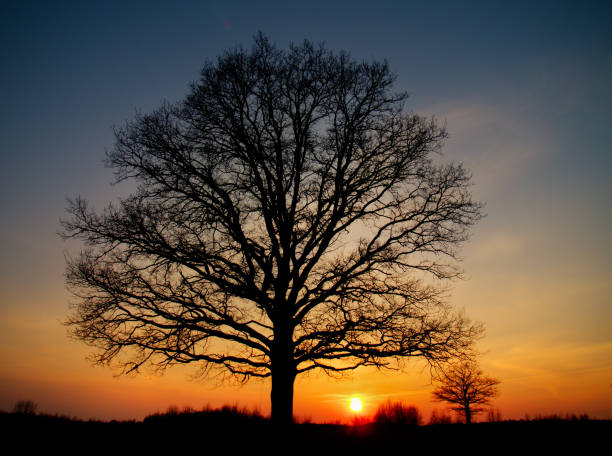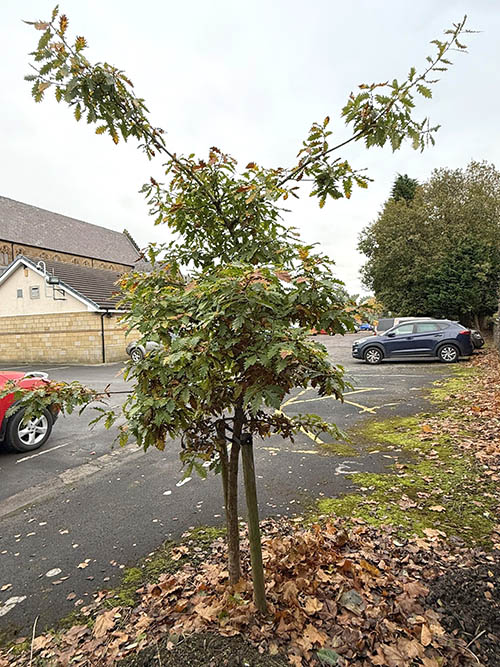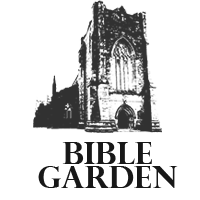Oak Tree (Quercus ruber)
Map Position: 10
There are about 500 species of oak. Quercus ruber, English Oak as we call it, is found in Israel, although it might not be indigenous there. We have chosen an English Oak as it does well in our climate, much better than other oak species that are found in the Holy Land as well. The Evergreen Oak or Holm Tree or Holm Oak is another tree in our Bible Garden (Position 6) and described in a separate chapter.
Oak trees are considered sacred in many cultures; meetings, tribunals, sacred ceremonies etc. were held under oak trees, they also marked graves.
Oak wood has been used for construction, furniture, barrels, boat building to name but a few.
Acorns have been used as food for human consumption and as animal fodder, although care must be taken as they can be toxic. Oak bark is used in medical preparations.
Biblical
The oak tree is one of the commonest deciduous trees in the Bible.
An oak tree can be a landmark that marks a specific place as in Genesis 12.6, where Abram “passed […] to the oaks of Moreh” or “settled by the oaks Mamre” (Genesis 13.8) and “the Lord appeared to him by the oaks of Mamre” (Genesis 18.1). Jacobs family “gave to Jacob all the foreign gods they had, […] Jacob hid them under the oak tree that was near Shechem” (Genesis 35.4 in RSV: terebinth tree in ESV). Deborah “was buried under an oak below Bethel” (Genesis 35.8).
The land of the Canaanites is described as “beside the oak of Moreh” (Deuteronomy 11.30). the boundary of the land of the tribe Naphtali “ran from Haleph, from the oak in Zaanannim and Adami-nekeb, and Jabneel, as far as Lakkum, and ended at the Jordan” (Joshua 19.33). Joshua “took a great stone and set it up there under the oak in the sanctuary of the Lord” (Joshua 24.26, in RSV, in ESV: terebinth tree).
Heber “pitched his tent as far away as the oak in Zaanannim” (Judges 4.11). An oak is not only place to pitch a tent but also a good place for an angel to sit: “Now the angel of the Lord came and sat under the oak at Ophrah” (Judges 6.11, RSV, in ESV: terebinth). It is also a place for a coronation: “they […] made Abimelech king, by the oak of the pillar at Shechem” (Judges 9.6). “Look, people are coming down from the centre of the land, and one company is coming from the direction of the Diviner’s Oak” (Judges 9.37).
Gideon prepared a meal with many ingredients “and brought them to… [the angel of the Lord] under the oak and presented them” (Judges 6.19, in RSV, in ESV: terebinth tree).
Samuel gave Saul instructions for his journey: “You shall go on from there farther and come to the oak of Tabor” (Samuel 10.3).
An oak can also be dangerous if you do not pay attention while riding under one: “Absalom was riding on his mule, and the mule went under the thick branches of a great oak, and his head caught fast in the oak, and he was suspended between heaven and earth while the mule that was under him went on” (2. Samuel 18.9). “And a certain man saw it and told Joab, ‘Behold I saw Absalom hanging in an oak.’”(2. Samuel 18.10). In this unfortunate position Absalom had no chance to defend himself and Joab “took three javelins in his hand and thrust them into the heart of Absalom while he was still alive in the oak” (2. Samuel 18.14).
Of course, you will find “the man of God […] sitting under an oak” (1. Kings 13.14).

An oak was used as a burial place not only as mentioned above for Deborah, but also for “the body of Saul and the bodies of his sons… [were buried] under the oak in Jabesh” (1. Chronicles 10.12). Oaks, known for their might and strength, reveal the power of the Lord when “the voice of the Lord makes the oaks whirl.” (Psalm 29.9 - RSV).
Isaiah proclaims God’s disappointment with sinful Israel: “For they shall be ashamed of the oaks that you desired; and you shall blush for the gardens that you have chosen. For you shall be like an oak whose leaves withers, and like a garden without water” (Isaiah 1.29 and 30).
He reminds us of the transience of all people and things and tells us to be humble: “For the Lord of hosts has a day against all that is proud and lofty, against all that is lifted up […] and against all the oaks of Bashan” (Isaiah 2.13).
He compares the people of Israel who will be scattered, to a tree that is cut down and from whose stump new shoots spring up: “like a terebinth or an oak whose stump remains when it is felled – the holy seed is its stump” (Isaiah 6.13).
He describes craftsmen and their work; the carpenter “cuts down cedars, or he chooses a cypress tree or an oak” (Isaiah 44.14).
Isaiah laments that the righteous are not respected but sinners speak up and are arrogant and “burn with lust among the oaks” (Isaiah 57.5).
Those who obey the commandments of the Lord “may be called oaks of righteousness, the planting of the Lord” (Isaiah 61.3).
The Lord will punish all those who sin against Him and worship other gods and will show His power: and Israel “shall know that I am the Lord when their slain lie under their idols around their altars, on every high hill, on all the mountain tops, under every green tree, and under every leafy oak, wherever they offered pleasing aroma to their idols” (Ezekiel 6.13).
The wealth of Tyre is explained by describing how they could afford expensive wood when they built their ships “Of oaks of Bashan they made […] oars” (Ezekiel 27.6).
When Suzanna was accused of adultery, Daniel asked the witnesses to specify their testimony. They should tell under which tree the sin had been committed: One said, “under a mastic tree” (Daniel 13.54) whereas the other said “under an evergreen oak” (Daniel 13.54 – 58 – RSV). Thus, Daniel was able to proof Suzanna’s innocence. See also 6. Holm Tree/Evergreen Oak.
Hosea describes the rites of sinners as “they burn offerings […] under the oaks, the poplars, and terebinth, because their shade is good” (Hosea 4.13).
The Lord explains how He punishes sinners: “it was I who destroyed the Amorite before them, whose height was like the height of the cedars and who was as strong as the oaks” (Amos 2.9).
It is a disaster when trees are destroyed: “Wail, oaks of Bashan, for the thick forest has been felled” (Zechariah 11.2).
It is interesting that oaks are not mentioned in the New Testament.
